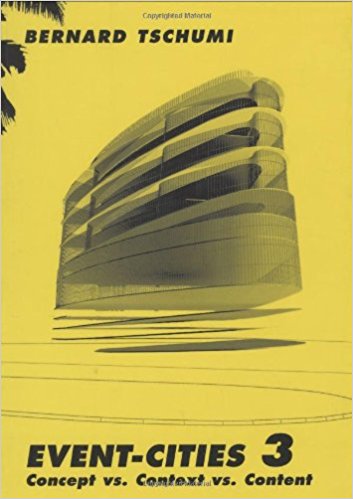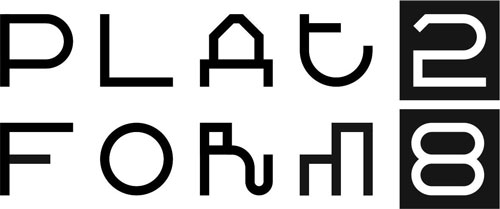
Event Cities 03
September 2005
By Bernard Tschumi
In Event-Cities 3, Bernard Tschumi explores the complex and productive triangulation of architectural concept, context, and content. There is no architecture without a concept, an overriding idea that gives coherence and identity to a building. But there is also no architecture without context -- historical, geographical, cultural -- or content (what happens inside). Concept, context, and content may be in unison or purposely discordant. Against the contextualist movement of the 1980s and 1990s, which called for architecture to blend in with its surroundings, Tschumi argues that buildings may or may not conform to their settings -- but that the decision should always be strategic.
Through documentation of recent projects -- including the new Acropolis Museum in Athens, a campus athletic center in Cincinnati, museums in Sao Paolo, New York, and Antwerp, concert halls in France, and a speculative urban project in Beijing -- Tschumi examines different ways that concept, context, and content relate to each other in his work. In the new Acropolis Museum, for example, Tschumi looks at the interaction of the concept -- a simple and precise museum with the clarity of ancient Greek buildings -- with the context (its location at the base of the Acropolis, 800 feet from the Parthenon) and the content, which incorporates archaeological excavations on the building site into the fabric of the museum. Through provocative examples, Tschumi demonstrates that the relationship of concept, context, and content may be one of indifference, reciprocity, or conflict -- all of which, he argues, are valid architectural approaches. Above all, he suggests that the activity of architecture is less about the making of forms than the investigation and materialization of concepts.
- Bracket 2: Goes Soft
- Cities: X Lines: Approaches to City and Open Territory Design
- City Sense and City Design: Writings and Projects of Kevin Lynch
- City Transformed: Urban Architecture at the Beginning of the 21st Century
- Collage City
- Combinatory Urbanism : A Realignment of Complex Behavior and Collective Form
- Critical Spatial Practice #6: The Roundabout Revolutions
- Delirious New York: A Retroactive Manifesto For Manhattan
- Designing Cities
- Event Cities 02
- Event Cities 03
- Event Cities 04
- Fast-Forward Urbanism: Rethinking Architecture's Engagement with the City
- Garden Cities of Tomorrow
- Going Public: Public Architecture, Urbanism And Interventions
- Heterotopia and the City: Public Space in a Postcivil Society
- La rue est à nous... tous! ( The street belongs to all of us! )
- Made in Tokyo: Guide Book
- Masterplanning the Adaptive City: Computational Urbanism in the Twenty-First Century
- Measuring The Non-measurable 02: Tokyo/bangkok/singapore
- Measuring The Non-measurable 03: Mn'm Workbook 1
- Measuring The Non-measurable 04: Mn'm Workbook 2
- Measuring The Non-measurable 05: Post-souvenir City
- Measuring The Non-measurable 06: Subjectivities In Investigation Of The Urban
- Measuring The Non-measurable 07: Mn'm Workbook 3
- Measuring The Non-measurable 08: In The Search Of Urban Quality
- Megastructure Reloaded: Visionary Architecture and Urban Planning of the 1960s Reflected by Contemporary Artists
- Monu #13 Most Valuable Urbanism
- Monu #14 Editing Urbanism
- Monu #15 Post-ideological Urbanism
- Monu #16 Non-urbanism
- Monu #17 Next Urbanism
- Monu #18 Communal Urbanism
- Monu #19 Greater Urbanism
- Monu #20 Geographical Urbanism
- Monu #21 Interior Urbanism
- Monu #22 Transnational Urbanism
- New City Spaces
- Points + Lines: Diagrams and Projects for the City
- Public Space
- Recombinant Urbanism: Conceptual Modeling in Architecture, Urban Design and City Theory
- S,M,L,XL
- Self-Sufficient City
- Small Scale: Creative Solutions for Better City Living
- Sociopolis Project for a City of Future
- System City: Infrastructure and the Space of Flows
- The City In The City: Berlin: A Green Archipelago
- The City, Seen as a Garden of Ideas
- The Death And Life Of Great American Cities
- The Endless City: The Urban Age Project by the London School of Economics and Deutsche Bank's Alfred Herrhausen Society
- The Exposed City: Mapping the Urban Invisibles
- The Public Chance: New Urban Landscapes
- The Self-Sufficient City: Internet has changed our lives but it hasn't changed our cities, yet.
- The Superlative City: Dubai and the Urban Condition in the Early Twenty-First Century
- Urban Future Manifestos
- Urban Intensities: Contemporary Housing Types And Territories
- Urban Solutions: Building Solutions, Green Solutions, Culture and Research
- Urbanity: Twenty Years Later: Projects for Central European Capitals
- Verb Connection
- Writing Urbanism: A Design Reader (The ACSA Architectural Education Series)
- Young-Old: Urban Utopias of an Aging Society


